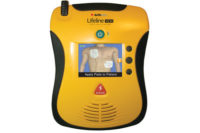AHA: Revamping CPR training could save many more lives

A pair of leading health care organizations think 50,000 lives a year can be saved by making changes to the way CPR is taught.
The American Heart Association (AHA) and Laerdal Medical, a major, global medical equipment and medical training products manufacturer based in Norway, are campaigning for a new standard of resuscitation quality and patient care centered on CPR competence.
Each year, more than 200,000 adult cardiac arrests occur in U.S. hospitals and less than 26 percent of adult patients survive. High-quality CPR is the primary component that influences survival from cardiac arrest, but there is considerable variation in monitoring, implementation and quality improvement. As a result, CPR quality varies widely between health care systems and locations. The overall odds of surviving a cardiac arrest in the U.S. can vary by as much as 42 percent between randomly selected hospitals.1
Skills "decay" quickly
For decades, Basic Life Support training has been the CPR training standard for health care providers, requiring participants to renew their course completion card every two years. Studies show CPR skills can decay within three to six months following this training.
To meet this challenge, in 2015, the AHA and Laerdal co-developed RQI, or Resuscitation Quality Improvement®. RQI is a self-directed, simulation-based performance and quality improvement program for health care professionals that offers “low-dose, high-frequency” hands-on learning sessions that provide vital CPR skills practice in 10 minutes every 90 days. RQI 2020 offers a comprehensive, end-to-end quality improvement program that will deliver higher CPR quality at a lower cost to health care systems and professionals. RQI 2020 will make its market debut in January 2019.
Science + technology
“The American Heart Association believes that preventable death from sudden cardiac arrest in hospitals is a public health crisis,” said AHA CEO Nancy Brown. “Our goal is to create a world where no one dies from cardiac arrest, and today, we are putting a bold stake in the ground to transform the standard of care for treating victims of preventable cardiac arrest. The power of partnerships at the intersection of science and technology, in collaboration with health care systems across the country, is the solution to save more lives and ultimately get to zero.”
The AHA and Laerdal made a commitment in February to save 50,000 additional lives from in-hospital cardiac arrest each year by 2025. This is based on RQI adoption in all U.S. hospitals. Currently, there are nearly 400 U.S. hospitals that have implemented the RQI program and more than 300,000 health care providers have improved CPR competency since the program’s introduction.
Reference:
1) Merchant, R M et al. “Hospital Variation in Survival after In-Hospital Cardiac Arrest.” Journal of the American Heart Association 3.1 (2014): e000400. Journal of the American Heart Association. Web.
Looking for a reprint of this article?
From high-res PDFs to custom plaques, order your copy today!






